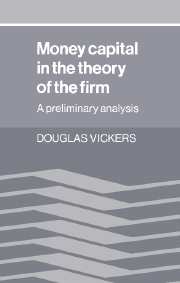Book contents
10 - Neoclassicism and an alternative perspective
Published online by Cambridge University Press: 18 September 2009
Summary
The place of money capital in the theory of the firm is interdependent with the analysis of production, pricing, and investment. The preceding chapters of Part II have examined these issues from the perspective of received traditions in the theory. But that analysis, though it has shed considerable light on the financing problem and the specification and usefulness of the cost of money capital, was shackled by the heavy weight of the neoclassical assumptions that it carried. In this chapter we shall look briefly at some of the logical and methodological difficulties inherent in the neoclassical apparatus of thought. Our discussion will not be exhaustive, and it will be designed principally to prepare the way for the alternative perspectives we shall consider in the remaining chapters of this part.
Production and factor employment
Consider first the production problem of the firm. The neoclassical theory proceeds on the assumption that it is possible to specify a production function in such a way that there exists an infinite divisibility of factor inputs and a continuous substitutability between them. The implicit factor relations that exist by virtue of their substitutability are described in terms of the isoquants in the factor input plane. Any such isoquant describes a locus of factor combinations capable of producing a specified level of output. Or more technically, the isoquant describes the set of factor combinations that produce the same output when the factors are combined in their technically most efficient way.
- Type
- Chapter
- Information
- Money Capital in the Theory of the FirmA Preliminary Analysis, pp. 191 - 196Publisher: Cambridge University PressPrint publication year: 1987



